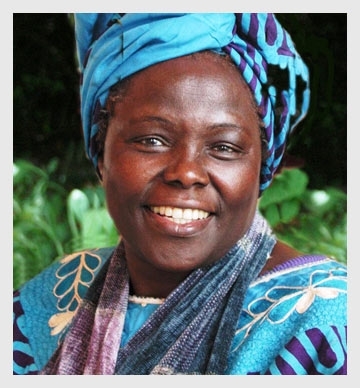 |
| ( ()) |
Aldo Leopold stated that "We abuse the land because we regard it as a commodity belonging to us. When we see land as a community to which we belong, we may begin to use it with love and respect." (Leopold) Wangari Maathai is a hero because she started the Green Belt Movement in 1977, and helped women in rural Kenya to plant trees. She won the Nobel Prize for the strength of her accomplishments. One important thing that happened in Maathai's life was that she got engaged to Mwangi Maathai, a businessman with political ambitions. They were married in 1969. She was living in rural Kenya where women were unable to cook because there was no wood for cooking fuel due to deforestation. This made Maathai start the Green Belt Movement. She founded the Green Belt Movement because there was a lot of deforestation in Africa. Later, Maathai was diagnosed with ovarian cancer. After so many complications of that disease; she died in September 25th 2011, three months before Christmas Day. Wangari Maathai should be considered a hero because of her tree planting and her dedication to fighting for women's rights.
"Wangari Maathai was an environmentalist who helped fight deforestation. "Maathai based her organization on the idea that the quality of the natural environment was closely related to the quality of life of the people living in that environment.About 90% of the African population depends on wood as cooking fuel. Because so many trees in Kenya had been cut down for fuel or for making charcoal, women found it increasingly difficult to get enough wood for their various domestic needs. As a result, they had to walk longer distances to find new supplies." (Gale, Scientists: Their Lives and Works) Around 1977 Maathai founded the Green Belt Movement. The Green Belt Movement is an organization that fights against deforestation by planting trees. It is important to fight against deforestation because deforestation can kill trees, make more species extinct, and can make unhealthier farm land, urban land, or desert. She protested against the government to protect the environment. "Time contributor Clive Mutiso described Maathai in these words: 'Only a strong person would defy the iron regime of Kenya's President Moi, and Maathai, 58, fits the bill,'" (Gale, Contemporary Authors Online). Sometimes, the government is not right so you have to protest against them. It would've been hard since you can either get arrested or be fined. Protesting can be the right way to correct the government if they did do anything wrong. Because of her work with the Green Belt Movement, she is considered an environmentalist.
Wangari Maathai is a hero for fighting for women's rights. "When Maathai returned to Kenya in 1966, the University of Nairobi hired her as a research associate in the Department of Veterinary Medicine. At that time, few women held such jobs in Kenya. Women were expected to be submissive (to yield to authority) and not seek higher education or employment." (Gale, African Biography). She held a job that many women weren't associated with. This shows that Maathai was fighting for African women's rights to do anything they wanted to do. Later, Maathai was able to fight for women's rights because she became a member of the government. In 2002, "she was appointed Deputy Minister of the Environment, Natural Resources, and Wildlife. Now as she serves as a lawmaker, she is in a good position to support or enact laws that will protect women's rights as human rights." (Gale, Scientists: Their Lives and Works) This shows that women's rights must be fought for, so they can have rights that all people should have. This proves that she is known for helping women have their rights like all men do.
Wangari Maathai is a hero for being a known environmentalist and for fighting for women's rights. She spent her life planting trees, and founded the Green Belt Movement in 1977. The Green Belt Movement is known for fighting against deforestation. She also helped women's rights by advocating for women to be able to attain higher education or employment. Wangari Maathai inspired me about protecting the environment and fighting against deforestation to save endangered species from extinction and also for advocating for women's rights.
Sources Cited: "Wangari Maathai." Newsmakers. Detroit: Gale, 2005. Biography in Context. Web. 28 Jan. 2015. "Wangari Maathai." Contemporary Black Biography. Vol. 97. Detroit: Gale, 2012. Biography in Context. Web. 28 Jan. 2015. "Wangari Maathai." Scientists: Their Lives and Works. Gale, 2006. Biography in Context. Web. 30 Jan. 2015. Wangari Maathai." Contemporary Authors Online. Detroit: Gale, 2011. Biography in Context. Web. 30 Jan. 2015. "Wangari Maathai." African Biography. Gale, 1999. Biography in Context. Web. 10 Feb. 2015.
Page created on 2/16/2015 4:41:30 PM
Last edited 2/16/2015 4:41:30 PM
